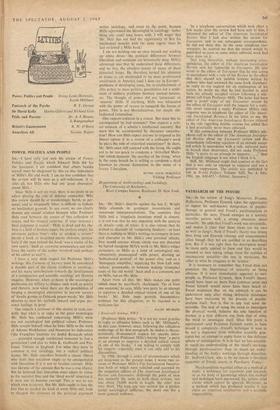Shils's diatribe against the late C. Wright Mills abounds in
grotesque inaccuracies and venomous 'misrepresentations. The assertion that Mills had a 'singularly incurious mind' is absurd; it is not true that he was impatient with the analysis of details—only of trivia; it is also untrue that he wished to discredit all 'competing thinkers'—at least there is nothing in Mills's writings to compare in tone and character to Mr. Shils's own personal attacks. Nor would anyone whose ..yision was not distorted by hatred recognise Mills's work in Mr. Shils's vulgar caricature, or Mills as a kind of sociological nut, 'obsessively preoccupied' with power, drawing an 'hallucinated portrait' of the power elite, and as a 'demagogic simplifier,' supplying the New Left with 'solace,' presumably in between making 'triumphal tours of the old world.' Such stuff is a comment, not on Mills, but on Mr. Shils: Apart from all this, Mr. Shils makes one point which must be specifically challenged. 'On at least one occasion,' he says, Mills 'was party to an attempt to suppress a detailed critical review of one of his books.' Mr. Shils mukt provide documentary evidence for this allegation, or be exposed as a malicious liar.
[Professor Shils writes: 'It is not my usual practice to reply to offensive letters such as Mr. Miliband's. In this case, however, since, following the ridiculous mutterings of his first paragraph, he makes a charac- teristically ill-mannered request for specific infor- mation about Professor Mills's having been "a party to an attempt to suppress a detailed critical review of one of his books, I am willing to comply with his request—especially since it can only add to his discomfiture.
'In 1960, through a series of circumstances which are irrelevant to the present issue, I wrote two re- views of Professor Mills's The Sociological Imagina- tion 'both of whi,ch were solicited and accepted by the respective editors of The American Sociological Review and Encounter. Although the point or view was naturally the same in both these reviews, one was about 10,000 words in length, the other was very short. The long one was written for a profes- sional sociological audience,, the short one for a more general audience.
'In a telephone conversation which took place a few weeks after the review had been sent to him, I informed the editor of The American Sociological Review that I had also written the review for Encounter, and in our subsequent correspondence, he did not deny this. In the same telephone con- versation, he assured me that the review would be published as soon as some minor editorial work had been done on it.
'Not long thereafter, without intervening corre- spondence, the editor of The American Sociological Review sent my typescript to Encounter. He also wrote to the editor of Encounter that he was acting in accordance with a rule of his Review to the effect that they should not publish reviews written by authors who had reviewed the same book elsewhere. In reply to my request for an explanation of his action, he wrote me that he had decided to send back my already accepted review following a tele- phone call from Professor Mills. The latter had been sent a proof copy of my Encounter review by the editor of Encounter with the request for a reply. (He never received a reply; Professor Mills's only response was to telephone the editor of The Ameri- can Sociological .Review.) In his letter to me, the editor of The American Sociological Review referred to the rule regarding double reviews but. added that it had practically never been enforced.
'If this connection between Professor Mills's tele- phone call to the editor of The American Sociologi- cal Review about my Encounter review and the immediately following rejection of an already accep- ted article in accordance with a rule, enforced more in breach than observance, did not make Professor Mills "a party to an attempt to suppress . ..," then the English language is not what I think it is.
'Still, Mr. Miliband might find comfort in the fact that it was only an attempt to suppress and not a genuine suppression. The article was published in full in World Polities, Volume XIII, No. 4, July, 1961, pp. 600-621:—Editor, Spectator.]






























 Previous page
Previous page